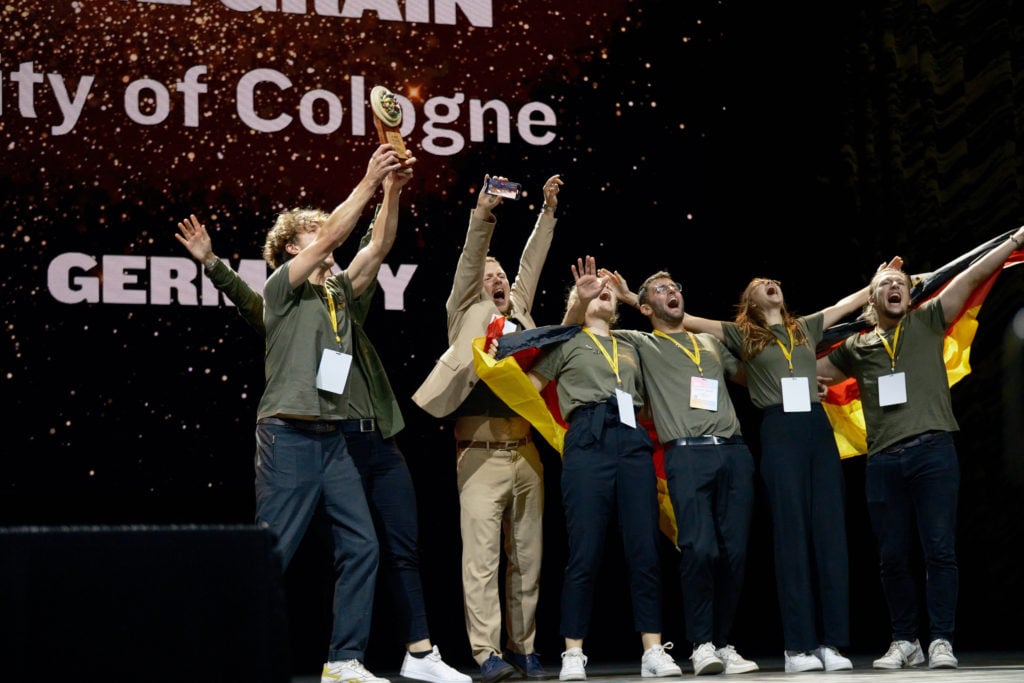Low-tech, Low-cost, Solar Grain Drying Innovation and Farming Cooperative Student Project Wins the Race to Feed the Planet Award
An Enactus student project from the University of Cologne, Germany took home the first-place prize of $15,000 in the ADM sponsored Enactus student competition, "Race to Feed the Planet." Student teams that were part of this year-long program created projects that addressed food insecurity issues through local plant-based agricultural solutions. The competition began with 68 teams from 16 different countries and culminated in the gathering of the finalists at the 2022 Enactus World Cup in November to compete for the top prize. The team from Cologne, Germany won the race with their project, "Save the Grain."
At Enactus World Cup, students compete, collaborate, make intercultural connections, and are inspired to further develop skills that foster social entrepreneurship. The Enactus World Cup is the culmination of a year or more of innovation by students launching social enterprises as part of Enactus, the world's largest experiential learning platform preparing the next generation of leaders to achieve the United Nations' 17 Global Sustainable Development Goals (SDGs).
The "Save the Grain" project was started with the aspiration to collaborate with independent African farmers to solve some of the daily challenges they face. During the harvest season, a quarter of the harvest gets lost due to the inability to properly store and dry the grain. Because of this inability, the farmers must sell their crops immediately after the harvest, which results in a huge market price drop for a short period of time. On top of this, because the farmers cannot store their own grain, this causes a large dependency on traders to buy it quickly. The traders then gain control of the market and buy the crops for such a low price, that many farmers cannot afford basic living necessities.
After working with an ADM mentor and the local farmer knowledge, the team developed a plan to work towards improving efficiency of the agricultural processes, as opposed to an increased supply. Out of this idea, the students created an easy-to-use and low-cost solar grain dryer. The sun is used to heat the dryer as warm air flows from the bottom to the top out the chimney, allowing the contents inside to dry and preventing harvest loss.

But the team wasn't done just yet. Along with the dryer, the students aided the local farmers in the foundation of a farmer co-operative, which allows the farmers the opportunity to collectively receive better prices on their harvest and collaborate in their work. The team continues to expand the dryers to countries such as Togo and Guinea-Bissau, and with their recent monetary prize, plans to continue this outreach even further.
Jan Weernink, Global Marketing Director, ADM BioSolutions mentored one of the finalist teams. He says, "ADM is proud to have been a sponsor of the Enactus Race to Feed the Planet challenge. As a leader in the agriculture space, we recognize the invaluable efforts of these innovative students and their projects supporting food security all over the world. It was a pleasure to have the opportunity to mentor a finalist team, the students of all teams involved are future leaders of the world, and we are happy to be a part of their path towards global food security and entrepreneurial leadership."
ADM is proud to support the Enactus Race to Feed the Planet challenge and is committed to investing in the future of food security and global food systems. This includes supporting the next generation of changemakers as they apply their minds and experiences to tackle food insecurity in local communities most in need. As a key player in the food and agriculture industry, ADM understands our role in the chain of command, and we are invested in learning how we can contribute to feeding our global population more sustainably.
Learn more at enactus.org.